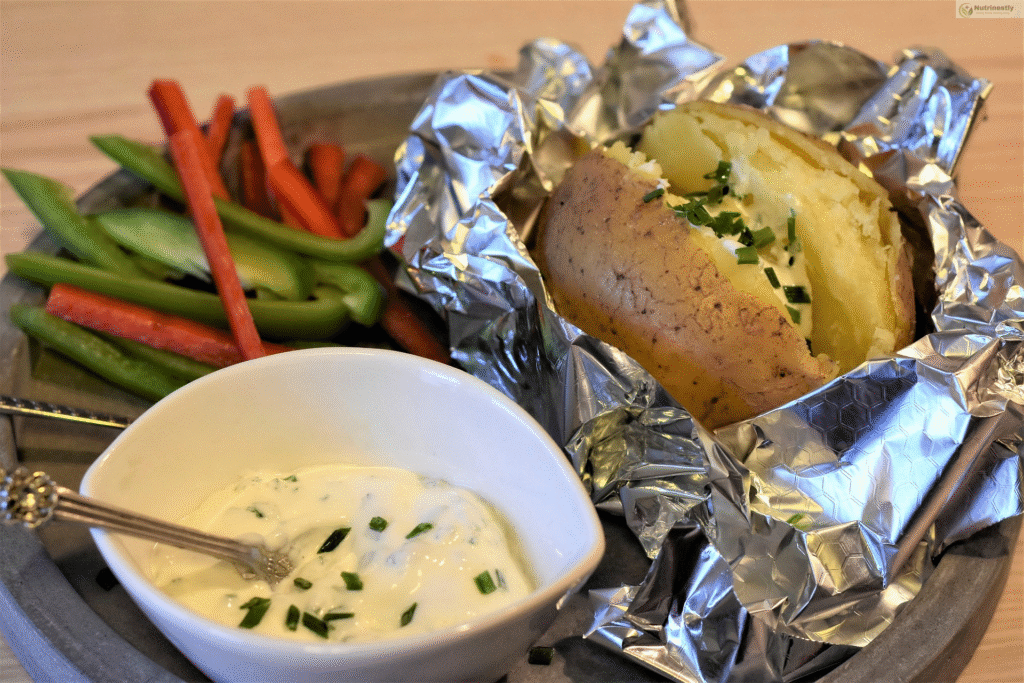
I.Starting with the Basics
Overview of the Baked Potato Nutrition Facts.
The unassuming baked potato is perhaps the world’s default comfort food. As a side dish or as the main attraction, it’s easy to make, adaptable, and very fulfilling. But beyond its deep flavor and light texture, the baked potato has a nutritional wallop that can unexpectedly enhance your diet.
Popularity Across Cuisines and Cultures
From British jacket spuds to American steakhouse vegetables, baked potatoes have taken over nearly every culinary niche. In the USA, they are typically served topped with butter, sour cream, and cheese, whereas in Britain, they may be filled with baked beans or chili for savory options. Around the globe, the baked potato is consumed in infinite varieties, demonstrating its versatility.
Standard Preparation Methods and Options
Baked potatoes are normally baked in the oven, but there are other ways. They can be microwaved for a faster cooking experience, or even grilled or air-fried for extra texture. The skin is normally left intact in order to maintain the vitamins and provide a crispy exterior.
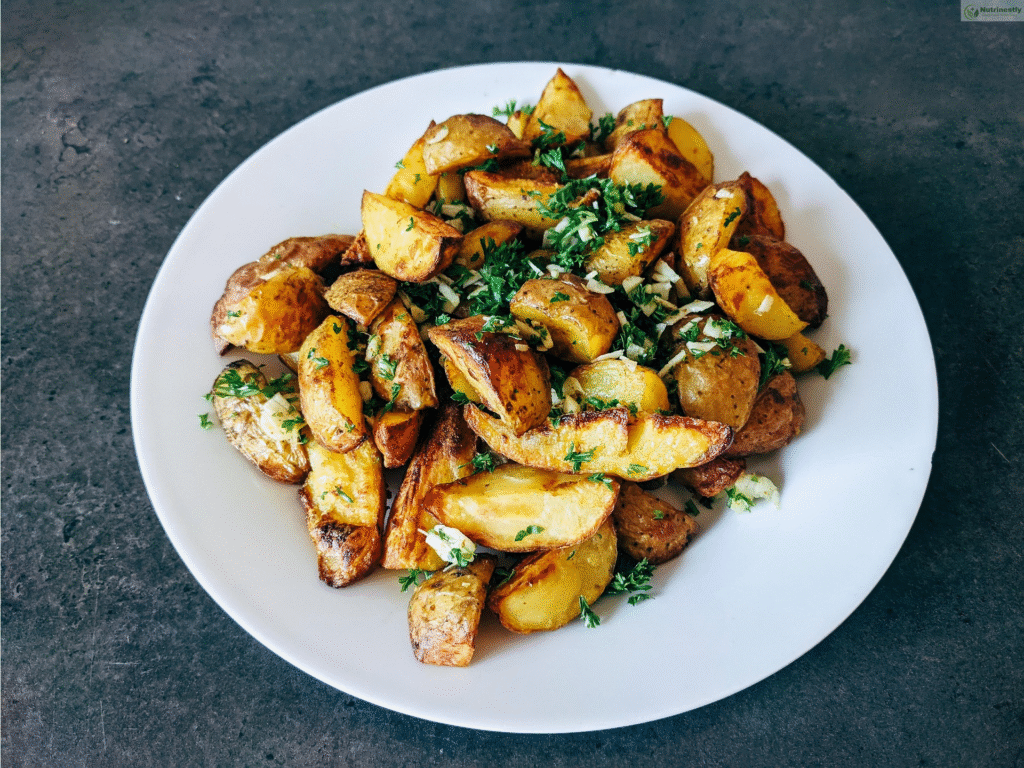
Importance of Understanding Nutrition
When one is discussing food, knowing what it is nutritionally is the first step towards healthier options. The baked potato, more often than not, is something that tends to go unnoticed. There is more to the baked potato than carbohydrates. In this guide, we are going to take a closer examination of the baked potato nutrition facts so that you understand better how this food can contribute to your diet.
Role of Baked Potatoes in a Balanced Diet
Adding baked potatoes to your meal can prove to be a great means of meal balancing. Since they are filled with lots of fiber along with a variety of essential vitamins and minerals, they serve as a wonderful and nutritious addition to any meal.
II. Nutritional Profile of Baked Potatoes
Caloric Content
A medium-sized 173-gram baked potato provides about 161 calories, making it a low-calorie food for those who want to keep their weight without sacrificing the completeness of a meal. It is also a suitable substitute for other sides, such as mashed potatoes or fries, which have a lot more calories.
Table 1: Simple Nutritional Values of a Medium Baked Potato (173g)
| Nutrient | Amount | % Daily Value (DV) |
|---|---|---|
| Calories | 161 kcal | 8% |
| Carbohydrates | 37 g | 13% |
| Protein | 4.3 g | 9% |
| Fat | 0.2 g | 0% |
| Fiber | 3.8 g | 14% |
| Vitamin C | 17 mg | 19% |
| Vitamin B6 | 0.5 mg | 27% |
| Potassium | 926 mg | 26% |
Comparison with Other Popular Side Dishes
Comparing the calorie content of a baked potato to other popular side dishes reveals that baked potatoes are a healthy, filling choice. For example, a medium serving of butter-topped mashed potatoes may have 214 calories, and a small serving of French fries may have 312 calories.

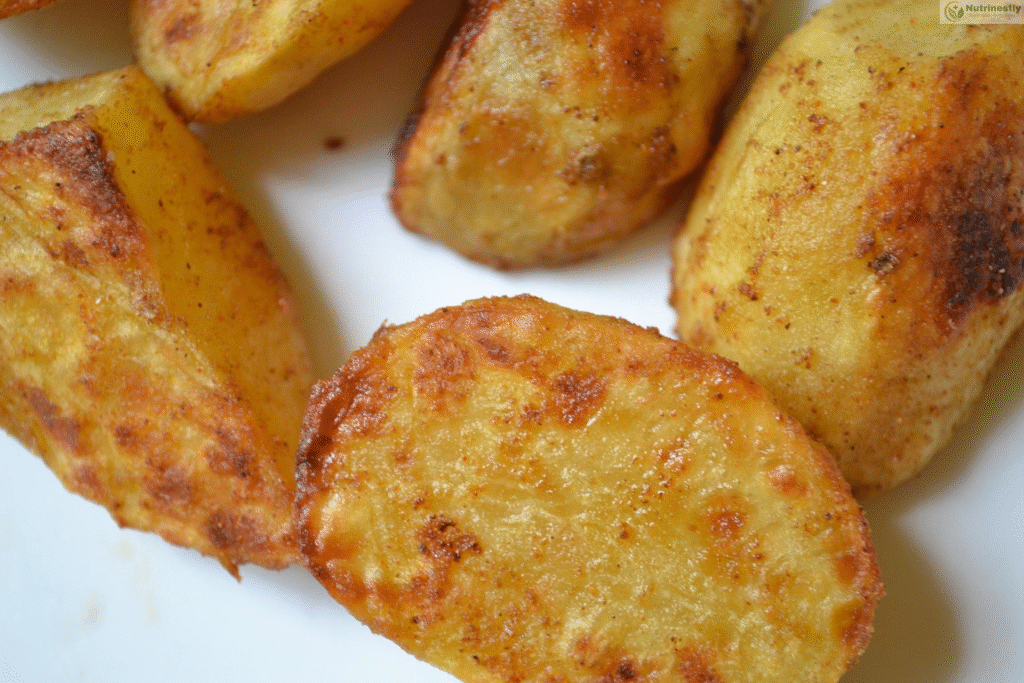
Macronutrient Breakdown
Baked potatoes contain mostly carbohydrates but a negligible amount of protein and virtually no fat. The macronutrients are in a ratio such that baked potatoes make an excellent side dish for nearly all meals.
Carbohydrates: Types and Their Health Implications
Potatoes are rich in resistant starch and complex carbohydrates, which result in delayed and prolonged release of energy. Such carbohydrates are beneficial in numerous facets of health, such as improved digestive health, as well as stabilizing the sugar levels in the blood.
Proteins: Amount and Quality in Baked Potatoes
Although potatoes are not a complete protein, they do contain a small quantity (around 4.3 grams per medium potato). The quality of the protein is good, with all nine required amino acids, although not in large amounts. Potatoes can be paired with other protein foods, such as beans or lentils, to create a more substantial meal.
Fats: Low-Fat Nature and Significance of Cooking Methods
Baked potatoes are low in fat by nature, containing only 0.2 grams of fat per medium potato. Fat levels may be high based on how the potato is prepared or topped. With topping using healthier toppings such as olive oil or Greek yogurt, fat levels can remain under control, but also provide nutrients and flavor.
Vitamins and Minerals
Baked potatoes contain Vitamin C, Vitamin B6, and Potassium. These are involved in immune function, brain function, and blood pressure regulation.
Major Nutrients
- Vitamin C: A Key antioxidant that supports iron absorption and immune function.
- Vitamin B6: Critical for brain function and red blood cell production.
- Potassium: Critical for cardiovascular function and fluid balance in the body.
How Baked Potatoes Help in Satisfying Daily Nutritional Requirements
A single medium-sized baked potato provides your body with almost 19% of your daily nutritional requirement for vitamin C, 27% for Vitamin B6, and 26% of Potassium. It is an excellent food to include in your diet.
III. The Health Benefits of Baked Potatoes
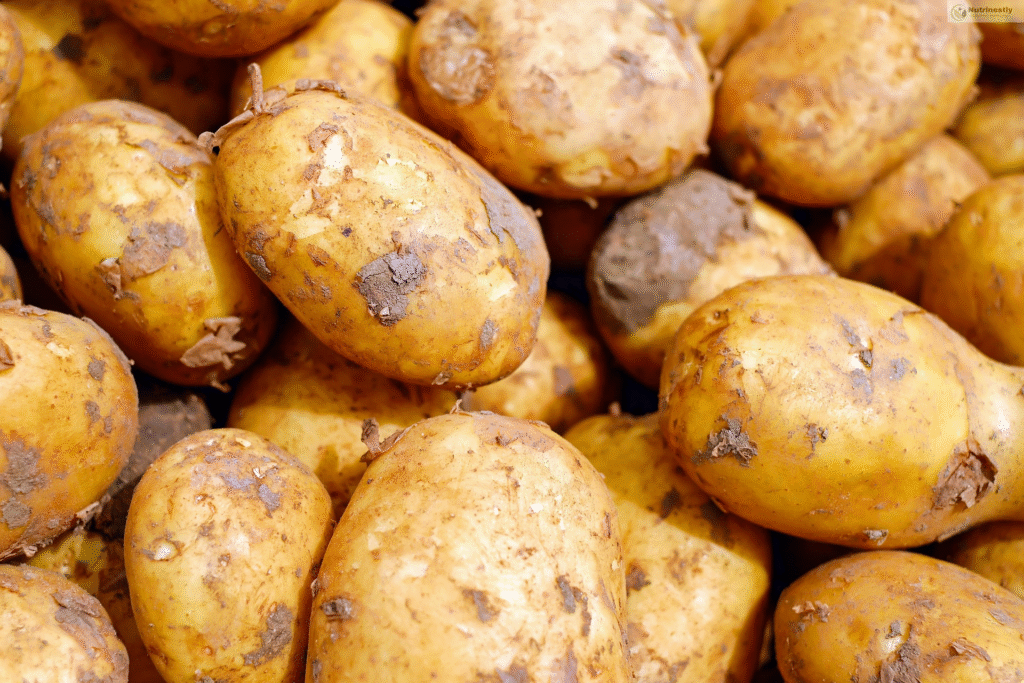
Gastrointestinal Wellness
Baked potatoes have a lot of dietary fiber if you include the skin. Fiber supports good digestive health because it causes a regular movement of the bowel, prevents constipation, and feeds good bacteria of the gut.
Regulation of Blood Sugar
Contrary to popular myths, baked potatoes have a medium glycemic index, thus do not lead to sudden increases in blood sugar. They are best suited for diabetics or for individuals who wish to keep their blood sugar in check. The resistant starch in baked potatoes also helps control blood sugar levels by delaying digestion.
Chart 1: Comparison of Glycemic Index
| Food Item | Glycemic Index |
|---|---|
| Baked Potato | 85 |
| White Bread | 70 |
| Rice | 72 |
| Pasta | 55 |
(Bar chart suggestion: Comparison of Glycemic Index of Different Foods)
Satiety and Weight Control
Due to high fiber content, baked potatoes benefit one by leaving them full for a long time. Satiety will turn baked potatoes into an ideal weight control diet. Incorporating them into the foods will avoid overeating risk since they induce satiety.
IV. Possible Detriments and Factors
Preparation Methods
Whereas baked potatoes are healthy, their health value can be compromised depending on their preparation. For instance, the addition of butter, sour cream, or cheese would raise the calorie value substantially and decrease the health value.
Table 2: Topping Calorie Add-Ons
| Topping | Calories Added |
|---|---|
| Butter (1 tbsp) | 102 kcal |
| Sour Cream (2 tbsp) | 60 kcal |
| Cheddar Cheese (1 oz) | 113 kcal |
| Greek Yogurt (2 tbsp) | 35 kcal |
| Steamed Broccoli | 15 kcal |
Portion Control
A baked potato doesn’t sound so terrible, but watch the portion size. While they are nutritious, large portions can cause overeating, especially when loaded with high-calorie toppings.
Allergies and Sensitivities
Potatoes are part of the nightshade family, and this may result in problems in people who are allergic to chemicals present in such plants. Also, even though potatoes themselves contain no gluten naturally, they may get cross-contaminated with gluten while cooking or processing them, so always be careful if you are gluten-intolerant.
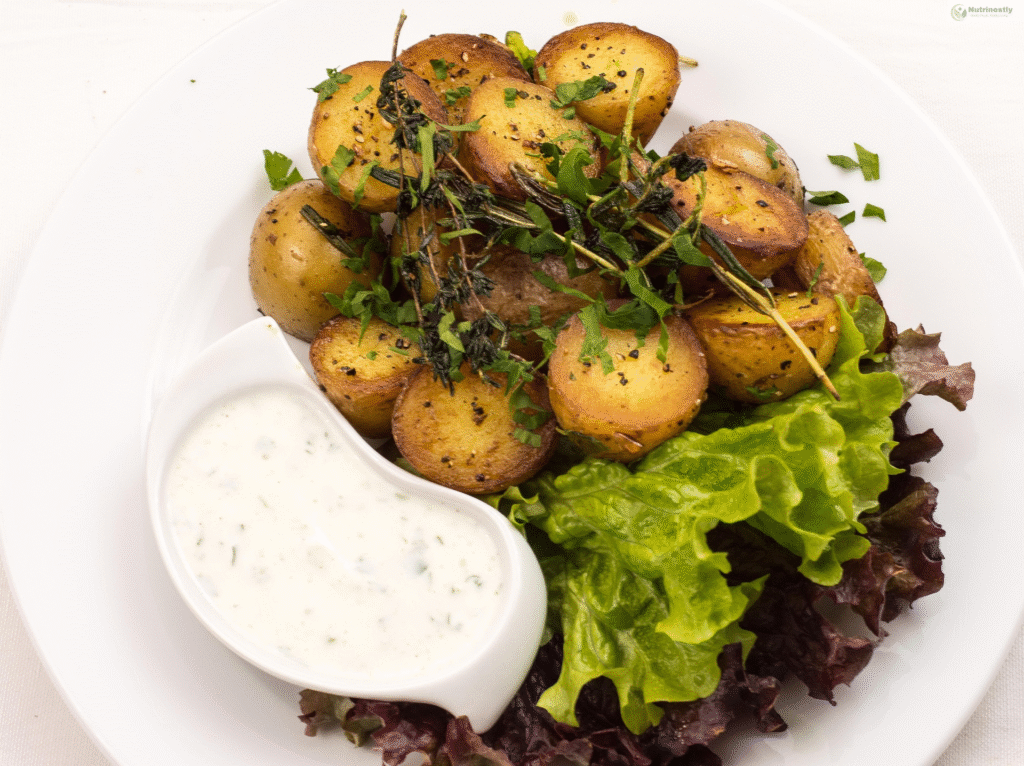
V. How to Eat Baked Potatoes
Innovative Toppings
Loaded baked potatoes are highly customizable and can be topped with a range of different ingredients to suit all tastes. As a healthier option, it’s worth replacing butter and sour cream with Greek yogurt, fresh herbs, or sautéed vegetables.
Table 3: Diet-Friendly Baked Potato Ideas
| Diet Type | Topping Combo Example |
|---|---|
| Vegan | Hummus + roasted veggies |
| Low-Calorie | Salsa + Greek yogurt |
| High-Protein | Cottage cheese + black beans |
| Paleo | Ghee + fresh herbs |
Meal Pairing Ideas
Baked potatoes are also an excellent base for a meal combination. Attempt to combine them with lean meat, grilled fish, or vegetable-stuffed salads and have a healthy and satisfying meal.
Recipe Inspirations
Twice-baked potatoes: A Perfect substitute where you remove the flesh, mix with healthy foods, and bake twice.
Stuffed baked potatoes: Stuff with sautéed mushrooms, spinach, and low-fat cheese to make a healthy dish.
VI. Conclusion
Baked potatoes are a tasty, healthy, and convenient food that can easily fit into a well-balanced diet. As a side or main course, they deliver vitamins, minerals, and fiber essential for good health in many ways. Get creative with various toppings and preparation to keep meals fresh and rewarding.
Don’t forget, moderation is the key! While baked potatoes are very healthy, enjoy them in moderation, especially when topped with high-calorie toppings. Incorporating this humble but powerful food into your diet can lead to improved digestion, improved blood sugar regulation, and even help with weight control.

